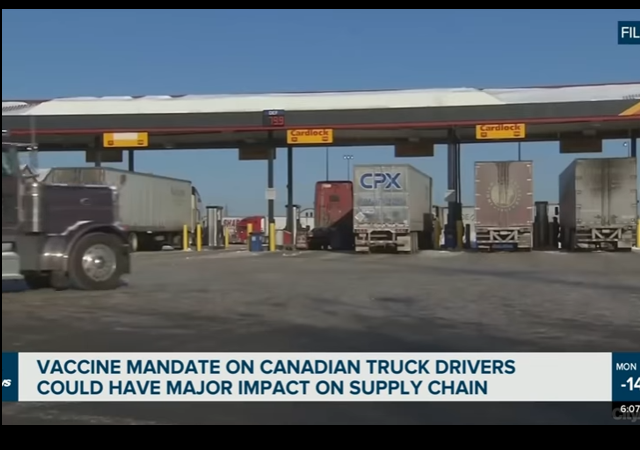Supply Chain Crisis Poised to Worsen as Vax Mandate Impacting Truckers Takes Effect

The Department of Homeland Security is now implementing rules that prevent noncitizen essential travelers crossing the border unless they are fully vaccinated.
The rules include truckers from Canada and Mexico.
Starting Jan. 22, travelers entering the United States at land ports of entry — notably along the Canadian and Mexican borders — and ferry points who are not U.S. citizens must be fully vaccinated against COVID-19, the Department of Homeland Security announced.The requirement, which takes effect at 12 a.m. ET that day, does not apply to U.S. drivers. However, Canada and Mexico have similar regulations in place that do impact U.S. drivers — including truck drivers — who make cross-border runs.The DHS announcement was released late on Jan. 20, and was one that the trucking industry had been anticipating, noted American Trucking Associations Chief Economist Bob Costello.“It applies to all Canadian and Mexican drivers,” he said. “I’m not too concerned about the Mexican drivers — the Mexican drayage drivers — they’re vaccinated at a pretty high rate. For the Canadian drivers, they now have to be fully vaccinated to get back into their country to go home. So they’re not going to come here if they’re not vaccinated.”
If the vaccines worked on a more permanent basis, perhaps there may be a case for the rule. However, their efficacy wanes over time and many double-vaccinated and boosted individuals have contracted covid.
Furthermore, the risk of adding another complication to an already over-strained supply chain cannot be over-stated.
Antonio Cachazo, Regional Director for International Transportation Services, indicates the potential severity of the situation that may impact supplies of many important items, such as medical supplies.
Cachazo said 100 percent of the Mexican drivers they work with are following the new requirements, but he says companies in Canada could possibly report issues.”I have heard that Canadian drivers there’s some reluctancy and I heard a number something like 20% are resistant,” added Cachazo.Cachazo said if many drivers leave because of the new requirements, it will continue to rattle the already struggling supply chain issues.He says it could possibly interrupt the transportation of electronics, car parts medical supplies.According to the U.S. Trade Representative, some of those items are the country’s top imports.“From the point of view of the supply chain– we’re very sensitive to any regulation that impede, or be an obstacle to the free flow of goods, which is heavily taxed by not having enough capacity already,” said Cachazo.
Meanwhile, in British Columbia, Canada, hundreds of truckers are set to roll out of Metro Vancouver Sunday on a cross-country convoy to the nation’s capital of Ottawa to protest the nation’s vaccine mandate for truck drivers.
Big rigs have departed northern B.C. for the drive south, where they will gather at the Nordel weigh scale in Delta early Sunday before the trek to Ottawa, the destination for the so-called Convoy for Freedom 2022.“We’ll all be in radio contact — trucks leave first, everyone else second,” said Sean Tiessen, a truck driver from Grand Forks. “There’ll be lots of honking, lots of garnering support and making noise and spreading the love.”Tiessen, who has been driving rigs for 23 years, will be behind the wheel of his own vehicle because he was unable to start his winter job hauling lumber across the border due to the vaccine requirement.“I can work elsewhere in the industry that doesn’t involve crossing the border, but I’m not taking it anymore,” he said.
The situation is so serious that the premier of Canada’s Alberta province called on the Canadian government to pause a COVID-19 vaccine mandate for cross-border truckers.
The mandate, imposed by Ottawa to help curb the spread of the coronavirus, has cost Canadian trucking companies about 10% of their international drivers, six top executives said this week. They said they are hiking wages to lure new operators during the worst labor shortage they have experienced.Alberta Premier Jason Kenney, at a news conference in Calgary, urged the government to extend an exemption that had been in place for truckers since the start of the pandemic.
One must now ask, are the consequences of these choices unintentional, or are they anticipated and welcomed by the politicians and bureaucrats who made them?
CLICK HERE FOR FULL VERSION OF THIS STORY